Photographer Nikki Toole describes the creation of her portrait of Rosie Batty.
This video was produced with funds donated by Tim Fairfax AC.
- [Nikki] Chris called me and asked me if I wanted to do a commission, and he told me the subject was Rosie Batty, so, I'd obviously knew about what happened to her, from the press. I shot in here because, I just thought "Well this would be quite a good room to shoot it in," and I think it should feel more relaxed than being in a studio environment. And I don't use any lighting, so the only thing I have is, I'll open the window, I had my camera, She just kinda sat here, I had my camera on a tripod, and I have one silver reflector. It's the way I shoot, absolutely all of the projects. So it just means there's not all that pressure, and it's always just the two of us, I don't have any assistants. I just wanted her to be herself, because she's strong and she's funny, you know, and she's so light-hearted, and I wanted that side of her to come through, but just in a really naturalistic way. And because we're just shooting in daylight, it was just beautiful and crisp and I just thought what could be really simple, and actually quite powerful looking as well. And Rosie had such a good energy when she sat down, and I think you can see that she kind of exudes it. All of my photography is based on film and cinema, because that's what I studied. I didn't study photography until I specialised in it later on, and I was going to be a cinematographer. So the way I approach a subject and the reason my images, I think, look like they do in terms of lighting, depth of field, facial expression, is because I come from that cinema background. With Rosie I was thinking of these Italian '50s, the quite strong women, because after reading her book, I thought this is one of the strongest people that I'm ever going to meet, cause she's incredible. And I just thought I want her to look like she's owning her own self, and her own power in a way. So I kind of already had an idea from that kind of. It seems really in depth for what's a very simple photograph but in my head I saw that kind of Charlotte Rampling, strong type of woman, and having to photograph her, I just wanted it to strip down and be really simple. And when she got here her eyes were incredible, because she always wears glasses. She has these really crystal blue eyes. They're so blue. And I just said to her, when she sat down, "Well how about we try without the glasses?" And I think she said "Well that's how people kind of recognise me and stuff," and I said "Well let's just try without because your eyes are incredible," and we never did any shots with the glasses at all, because I just thought she just looked amazing. I don't retouch, and we did talk about that. And she understood that, and she was actually in favour of that, which I thought was great, because I think she's beautiful. You know, I think the thing is people have this idea of them selves and beauty and what it is and it's actually a very different thing, it's a much more tenuous thing than the idea of beauty and what's acceptable. And I think when people retouch an image I think you're creating this false idea of them. I think there's a beauty that comes out of, you know, life showing on your face. There's nothing more beautiful than someone just looking like they are, because we like to be able to relate to people in photographs. I would rather say relax, or just talk to you and let you be, because I think when we're just sitting, and just being who we are, that's when you're truer to yourself in some way. I'd always shot film when I used to type 55 polaroid, which is a 4x5 camera, which is quite big with the bellows, I would never dream of using digital, but now that I use digital I love it because I can travel, and I can see my images straight away. But I still never usually take more than five or six images of anyone because I find after the first two, they're starting to become conscious of the camera and I just don't see the point in shooting hundreds of images and then going through them and finding one that works. I just talk to them and wait, and then I'll see the image. Unless they sneeze, or blink or something, that's the image. I can see it anyways, so there's no point in shooting lots, I think, even with the digital. People say "Why didn't you shoot more?" But I usually know, you know when you've got it, and it's always usually the third image or something.
Related information
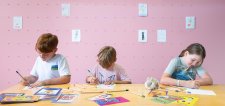
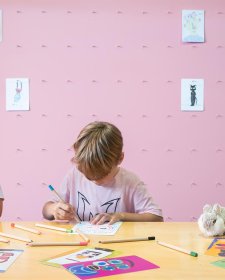
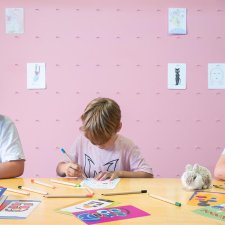
Art cart
Thom Roberts
Drop into the Gallery any time for free creative activities inspired by artist Thom Roberts and his exhibition, The Immersive World of Thom Roberts.
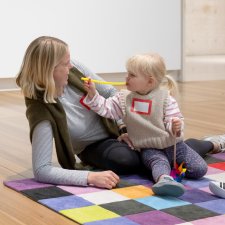
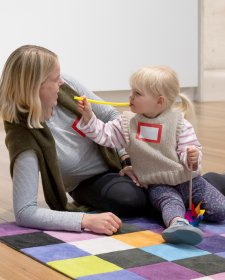
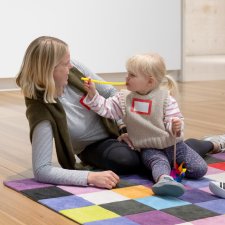
Portrait Play
Face the music
Join us for Portrait Play these school holidays as we explore portraits and music. Come and meet the people that live on our walls, discover musical instruments hidden in the portraits and get creative on your journey through the galleries.
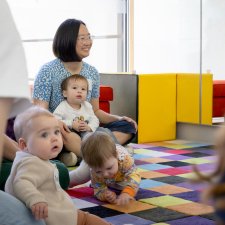
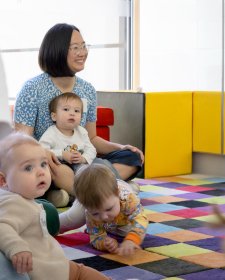
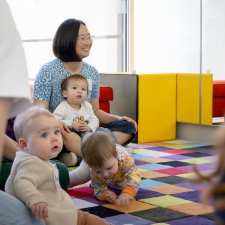
Little Faces
Do we have a treat for the smaller humans in your life! Little Faces is for babies and toddlers (with their grown up) to play, sing and have fun discovering a portrait together.




